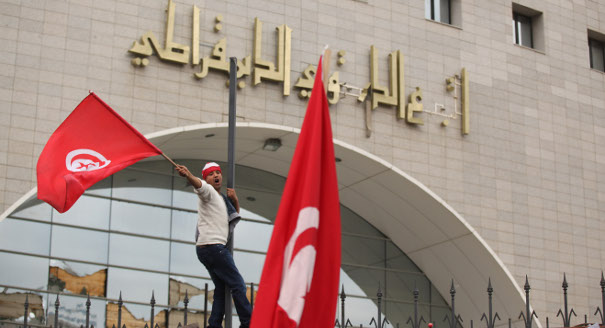Members of Tunisia’s National Constituent Assembly—the democratically elected body responsible for drafting the country’s constitution—put forward a new bill on November 23 which would exclude politicians once affiliated with the former ruling Constitutional Democratic Rally (French acronym, RCD) from political life for ten years. Entitled “The Protection of the Revolution,” the measure—proposed and supported by Ennahda MPs—is being seen by some as a tactic to hinder an opposition front to Ennahda and ensure the Islamists’ dominance in the upcoming election. Its supporters, however, see it as a protective measure necessary to safeguard the revolution.
Sahbi Atig, the head of Ennahda’s parliamentary bloc, explained that the bill would forbid any politician who had served in the RCD from running for president and participating in political life. Ennahda controls 89 out of 217 seats in Constituent Assembly and can easily pass the bill by an overwhelming majority—with the support of four other major blocs backing the measure: i.e., Fidelity to the Revolution, Congress For the Republic, Freedom and Dignity, and the Democratic Bloc—as well as some independent MPs. Farida Laabidi, head of the government’s Commission on Rights and Liberties (and a member of Ennahda himself) explained that “Through this law we will guarantee that those who served under the former repressive and corrupt regime will not rule the country again.”
Nidaa Tunis has a wide range of secular liberals formerly associated with the RCD—which claimed a membership of two million people before its dissolution. Many of these saw in Essebsi’s party an opportunity to revive their political chances and perhaps even regain their lost status. Nidaa Tunis, which aims to unite Tunisia's non-Islamist parties in a national unity movement, was perceived as a way to “protect” them from religious extremism and to uphold a modernist interpretation of Islam initiated under the Bourguiba and Ben Ali regimes—which these former RCD-associates see Ennahda failing to do, if not supporting explicitly. Essebsi himself is especially outspoken in his criticism of the ruling coalition for its “failure” to protect its people from religious extremism and Salafism.
The pragmatism of which Essebsi’s party boasts and its espousal of “modernist” values—coupled with Ennahda’s perceived failures to deal with pressing socio-economic issues—have all given Nidaa Tunis an edge and a chance to have a strong showing in the coming election. According to a recent poll conducted by the Tunisian poll office and 3C Etude, Ennahda and Nidaa Tunis rank fairly close in popularity. The party has also announced an initiative to merge with the ranks of other center-left parties—among which include Al-Joumhouri, Al Massar, and the Popular Movement, as well as others—in anticipation of the 2013 parliamentary and presidential elections. Essebsi and his followers believe that the only way to counter Ennahda is through a united opposition front.
Ennahda’s fear of a more robust opposition in the upcoming election may well be the motive behind its support of the proposed bill. And whether or not a concern for the rise of former-regime sympathizers is founded, a bill based on political exclusion and score-settling does not bode well for Tunisia’s fragile political process. By pushing it forward, Ennahda is doing exactly what it claims to protect the revolution from: creating a one-party system and attempting to ensure an opposition vacuum—bringing the ruling party more in line with the RDC than it would perhaps like to admit.
Sana Ajmi is a Tunisian journalist and writer.





